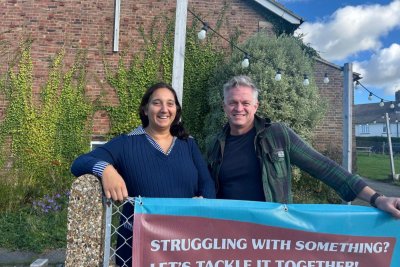 Volunteers from St Richards Community Support Cafe. Credit: St Richards Community Support Cafe
Volunteers from St Richards Community Support Cafe. Credit: St Richards Community Support Cafe
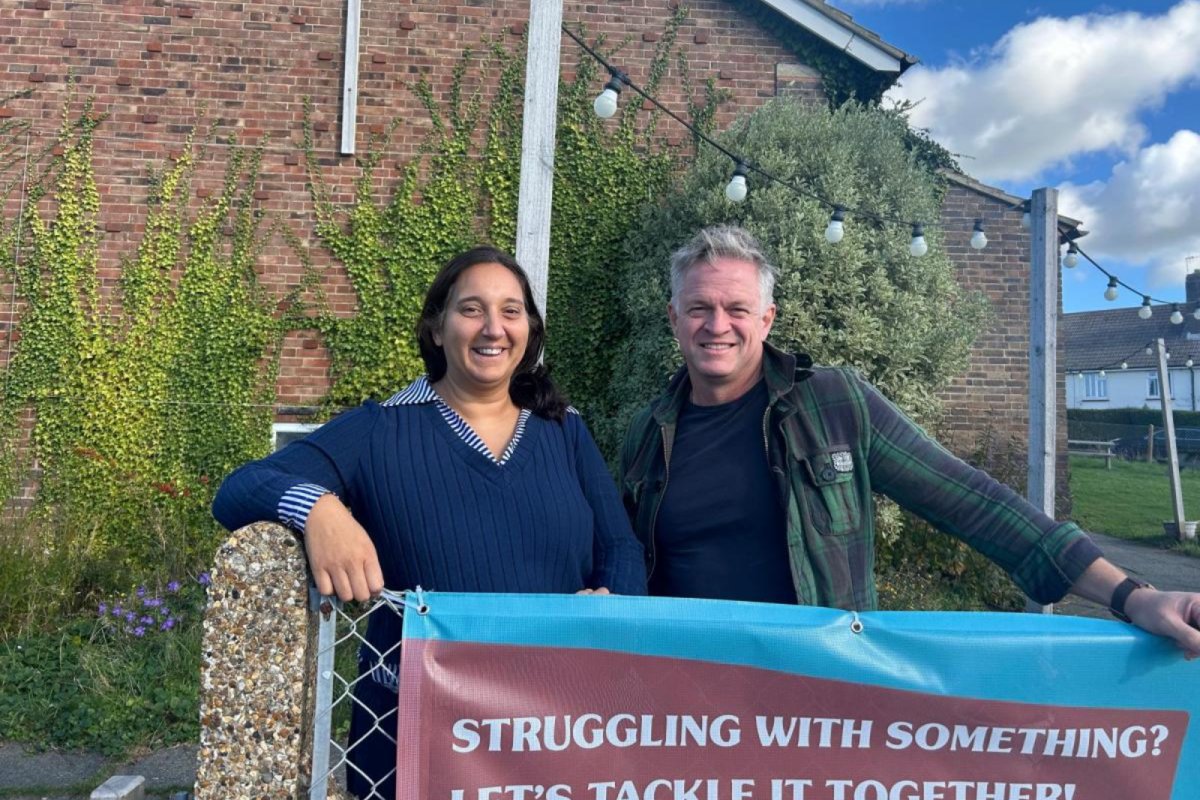
Beyond the food bank model: spotlight on Hollingdean Food Bank and St Richard’s Café
Hollingdean Food Bank has closed its doors after shifting to provision of holistic wraparound support that reduced need for food parcels. We spoke to Laurel Nathan, Manager and Lead Support Worker at St Richard's Community Support Café to understand why and how.
When Hollingdean Food Bank chose to close its doors on 1 October 2025, this didn’t mark the end of a community support service but a transition to something else. This strategic decision was made to shift from a focus on providing a crisis response to empowerment as they sought to address the underlying issues facing their service users, offer a dignified cash-first approach, and a focus on preventing crisis and building resilience among the community.
At the start of 2024, the food bank was supporting around 80 households a week, providing approximately 3,500 emergency food parcels a year. By taking an individualised approach to each household and seeking to address the root causes of food insecurity, the number of households needing emergency food parcels steadily reduced to only 4-5 households a week. This led the organisation to the decision to move away from a food bank model and focus on using resources to provide holistic wraparound support to the community, through the onsite St Richard’s Community Support Café which remains open.
Following the transition, the St Richard’s team now supports around 10–20 people each week, helping roughly four households with food emergencies. Instead of food parcels, for those needing emergency food support this is now offered in the form of supermarket vouchers to cover a week’s supply of food, as well as offering budget-friendly shopping lists, and the option of a volunteer to accompany anyone who would like support to shop for a week’s groceries. St Richard's also grow their own food which is shared with the community.
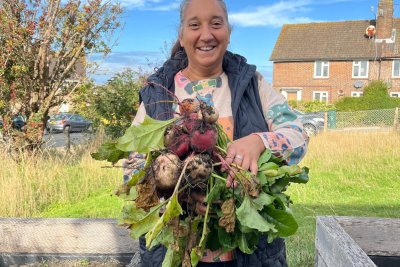
How they made the change
The transition did not happen overnight. Upon joining the organisation, Laurel Nathan, service manager closed the food bank for a month to take stock and focus on strategy and logistics, with some admin support.
During this period, every food bank client was spoken to one-to-one about their situation and what kind of support would be most useful to them, particularly support that they weren’t able to access elsewhere so services were not being duplicated. This ensured that resident voices were involved in shaping the future of the service.
Laurel Nathan, manager of St Richard’s Café, described the rationale for the shift:
“I believed food bank users were being lumped together, without recognition of their individual circumstances. That didn’t sit right with me. I wanted to treat people with dignity and help them find sustainable solutions.”
Many said they didn’t want emergency food parcels anymore, as this wasn’t addressing the root cause of their issues, but they needed budgeting help, advice and support, or simply human connection. By assessing the needs of the community and training volunteers, the organisation was able to provide personalised support and could offer more dignified and choice-based services. On top of this, volunteers were freed up to have more time for conversations when the burden of running the food bank was removed, creating a more holistically supportive environment that doesn’t focus solely on addressing food needs.
For those that were experiencing financial crisis, the food bank initially moved from 3 day’s supply of food to offering a full week’s supply as less people required this support, offering as much choice of food as they could. Volunteers had significantly more time available to understand people’s circumstances and support needs, and direct people to impactful support services alongside providing food, leading people to no longer require emergency food provision. As the ask for emergency food reduced, the organisation felt they could no longer justify the capacity needed to provide a small food bank service, switching to offering supermarket vouchers to the small number of people experiencing crisis, and focussing on upskilling the team to provide hoistic wraparound support. This significantly reduced the burden on staff and volunteers of running a food bank service, while offering a more dignified and cash first approach which was preferable to clients.
What is a cash first approach to food insecurity?
Taking a cash first approach to food insecurity ultimately means everyone has the means to access the essentials, including nutritious and appropriate food in a dignified manner through real Living Wages and an adequate social security system. At a local level this also means timely and appropriate crisis payments (ideally via direct cash payments, but in some cases cash equivalents are more appropriate) when someone experiences a financial crisis. These payments would be accompanied by good quality, easily accessible advice and support services available to support people to improve their circumstances and avoid falling into crisis again. Crucially cash first is not cash only, with wraparound support and work to prevent people falling into crisis being absolutely central to the approach, as evidenced so well by St Richard's.
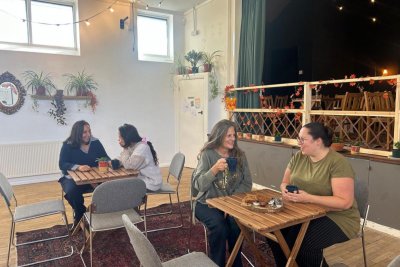
Partners and wraparound support
Through the Trussell financial Inclusion team, St Richard’s Café partnered with Citizens Advice, who offer benefits advice to help people maximise their incomes. They also work with several outside agencies who provide onsite support in the café including Together Co (social prescribers), Macmillan Cancer Support, BHesco, Southern Water, Christians Against Poverty and Breakeven who provide support around gambling addiction. There is also an affordable food scheme in the area that St Richard's works closely with, which also offer food support as well as offering a continuation of access to wraparound support services.
Service Manager Laurel has a background in supporting adults with complex needs, including families in crisis, people experiencing homelessness, and people experiencing the criminal justice system, as well as being a trained debt coach. Laurel approached the role of food bank manager with the experience of providing debt advice across food banks in Brighton and learning that several food banks were struggling with “not enough funds, not enough food, and constant anxiety about meeting demand”, and the sheer volume of need meaning food banks could often only focus on food distribution and not on deeper support or wider systemic change.
This experience informed the decision feeling right for them to transition away from a food bank model towards a focus on taking a holistic and personalised approach to providing support:
“It became clear to me that something needed to change. If we could reduce the number of people who had become stuck in the system, we could start addressing the root causes of food insecurity. Many users weren’t just hungry—they were disempowered, dependent, and often hopeless. I even saw people requesting food vouchers simply for human contact, because they felt it was the only way to be seen and heard.”
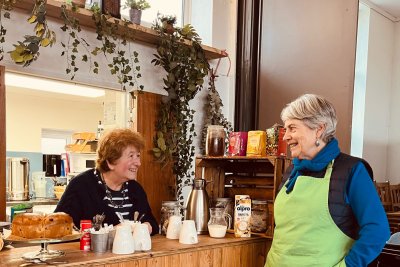
Funding and challenges
The transition hasn’t been without challenges, particularly in retraining volunteers for new roles and managing the reactions of other local services that felt uncertain about the shift. There is one paid member of staff leading the project and a team of seven volunteers, with hopes to grow that number as the café and community support expand. Like the church itself, St Richard’s Community Support Café continues to rely on grants and donations. The support offered remains entirely free and does not generate income, hence will be dependent on funders recognising the value of providing holistic wraparound support to the community going forwards.
What’s next for St Richard's?
The vision for St Richard’s Community Support Café is long-term. Located in one of the areas ranked highest for deprivation nationally, their goal is to see the community flourish over a generation so that the children born today will raise their own families in a healthier, more food secure and resilient environment.
In the shorter term, the feedback from the community inspired the launch of new cooking courses focussed on cooking on a budget, and plans are now underway to start a recovery group in the new year. Laurel emphasised that the services delivered by the organisation will fluctuate with and be led by the needs of the community.
Is this model replicable?
St Richard’s is not the only food bank to take the approach of transitioning to another model, with several others across the country looking at changing, adding to or evolving the services they offer in their communities, based on the local needs and circumstances. Another example is First Love Foundation, based in Tower Hamlets. However, this work takes time and capacity to enable strategic thinking and consult with communities, and support with training and planning, and it may not be right for every food bank. Laurel says:
“It can be done. Consider the plan, work out a time frame of who is doing what; consider closing for at least 2 weeks to be able to relaunch with the transition mode and be consistent…This isn't a miracle and doesn't need to be a one off. And help is available if they want to talk it through!”
What changes are needed at a national level to help communities facing food insecurity?
The team at St Richard’s have demonstrated the transformative work that can be done at a local level. When asked about what action is needed from the national government, the team believes several changes are essential to meet their mission to ‘end mass dependency on emergency food parcels.’ These include:
Actions to end poverty and food insecurity and ultimately end the need for charitable food aid including:
- Access to truly affordable housing to ease the financial strain on households.
- Living wages and social security payments so people can afford food.
- Better Employment Support for Universal Credit Claimants so that those deemed fit to work can realistically do so.
- Investment in community food projects that offer a sustainable alternative to food banks and promote resilience and positive food spaces for the community.
While charitable food aid is needed:
- Guidance and standards for food support to ensure fairness and consistency across the UK – currently there is a post code lottery as to the availability, type and quality of support available.
- Professional standards for food bank management to include wraparound support, recognising the complex skills needed to provide holistic wraparound support in these vital community roles.
- Proper training and support provided to those working and volunteering in food banks.
These measures, they argue, would help people not only survive but also restore dignity to communities.
The work done by the team at St Richard’s is a truly brave and innovative example of community service transformation, taking a community and place-based approach. They are now creating sustainable and long-lasting positive change in people’s lives, shaping support around the needs of the communities they serve.
You can access Sustain’s toolkit on developing more sustainable models of community food support here, and see more of our case studies here.
Food Poverty: Championing people-powered projects that tackle the root causes of food poverty.
Sustain
The Green House
244-254 Cambridge Heath Road
London E2 9DA
020 3559 6777
sustain@sustainweb.org
Sustain advocates food and agriculture policies and practices that enhance the health and welfare of people and animals, improve the working and living environment, promote equity and enrich society and culture.
© Sustain 2026
Registered charity (no. 1018643)
Data privacy & cookies
Icons by Icons8







